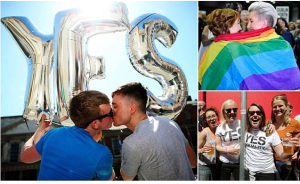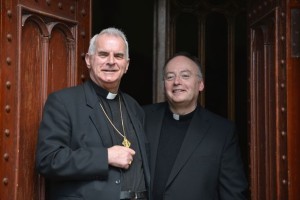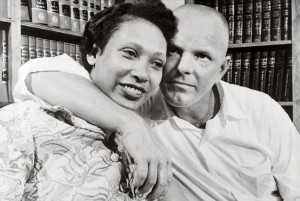 This might seem a surreal joke, but Ireland has become the first nation in the world to legalize gay marriage in a national referendum.
This might seem a surreal joke, but Ireland has become the first nation in the world to legalize gay marriage in a national referendum.
Ireland’s citizens have voted in a landslide to legalize gay marriage, electoral officials announced Saturday — a stunningly lopsided result that illustrates what Catholic leaders and rights activists alike called a ‘social revolution.’
(The Associated Press, May 23, 2015)
Mind you, the pope himself appeared to bless this seminal event almost two years ago.
Pope Francis replied, when asked about the Vatican’s alleged ‘gay lobby,’ that while a lobby might be an issue, he doesn’t have any problem with the inclination to homosexuality itself: ‘Who am I to judge them if they’re seeking the Lord in good faith?’ he said.
(National Catholic Reporter, July 29, 2013)
Such sublime, passive-aggressive expression of his moral authority led CBS News to run a March 15 report under the headline, “Pope Francis after 2 years: A revolution at the Vatican.” No doubt the outcome of this referendum is “stunning.” But it seems wholly consistent with this pope’s revolutionary mission.
Of course it is a curious thing that, despite the pope’s apparent blessing, leaders of the Irish Catholic Church mounted a holy crusade against this referendum. Except that these are the very leaders who the pope has publicly criticized for showing more devotion to the traditions and practices of their religion than to the word and spirit of the Almighty God.
 More to the point, this liturgical dissonance is thrown into sharp relief when one considers that their traditions and practices include condemning homosexuality while:
More to the point, this liturgical dissonance is thrown into sharp relief when one considers that their traditions and practices include condemning homosexuality while:
- engaging in homosexual/pedophile acts themselves.
- providing indulgences for priests who sexually abuse (aka rape) little boys.
- knowing full well that a “gay cabal” has always wielded dogmatic power in their Holy Curia – as even I have duly noted in such commentaries as “Pope Confesses: There’s a Gay Cabal in the Vatican,” June 13, 2013.
This infernal legacy of sodomitic hypocrisy accounts not only for the “hidden exodus of Catholics becoming Protestants,” but also for the growing disconnect even between Church leaders and die-hard members, which the outcome of this referendum reflects.
Still, as much as I laud what the Irish have done, I fear they have set an untenable and misguided precedent. After all, the right to marry is as fundamental as any human right. And, as the late Justice William Brennan (of the U.S. Supreme Court) might have opined, it offends all notions of fundamental fairness, which is essential to the very concept of justice, for members of any group to have the exercise of their fundamental rights subject to a referendum.
For example, it does not offend in this regard to have a referendum on whether Scotland should leave the UK, or whether the UK should leave the EU. For not only is there no fundamental right at stake, but the result would affect everyone in the country … equally.
 By instructive contrast, if the right to marry across racial lines had been put to a referendum in the United States during the 1960s, the vote against interracial marriage would have been as decisive as the vote for gay marriage in Ireland was on Friday.
By instructive contrast, if the right to marry across racial lines had been put to a referendum in the United States during the 1960s, the vote against interracial marriage would have been as decisive as the vote for gay marriage in Ireland was on Friday.
Thanks to the luck of the Irish, the ends justified the means in their case. But it’s far more preferable to have fundamental rights codified by legislatures and/or affirmed by courts – as nineteen other countries, including South Africa, Uruguay, and The Netherlands, have done with respect to gay marriage.
Incidentally, in the United States, gay marriage is legal in 37 states: 26 by courts, 8 by legislatures, and only 3 by referendum. But, as the fight for abortion rights demonstrated, denying citizens in any state any fundamental right, which citizens in other states enjoy, presents all kinds of constitutional challenges.
It just so happens that the U.S. Supreme Court will hand down a consolidated ruling on several gay-marriage cases (cited as Obergefell v. Hodges) this summer. I predict it will be a unanimous ruling in favor of the fundamental right to marry nationwide, relying heavily on the precedent the Court set in Loving v. Virginia, U.S. Supreme Court, 1967:
Marriage is one of the ‘basic civil rights of man [and woman],’ fundamental to our very existence and survival… To deny this fundamental freedom on so unsupportable a basis as the racial [or gender or sexual orientation] classifications embodied in these statutes, classifications so directly subversive of the principle of equality at the heart of the Fourteenth Amendment, is surely to deprive all the State’s citizens of liberty without due process of law.
For the reasons stated, I urge members of any minority group demanding legal recognition and protection of their fundamental rights to seek recourse in the courts, not at the ballot box. Accordingly, with this procedural reservation, Ireland’s referendum on gay marriage is
Affirmed.
Related commentaries:
Pope confesses…
Petty politics…